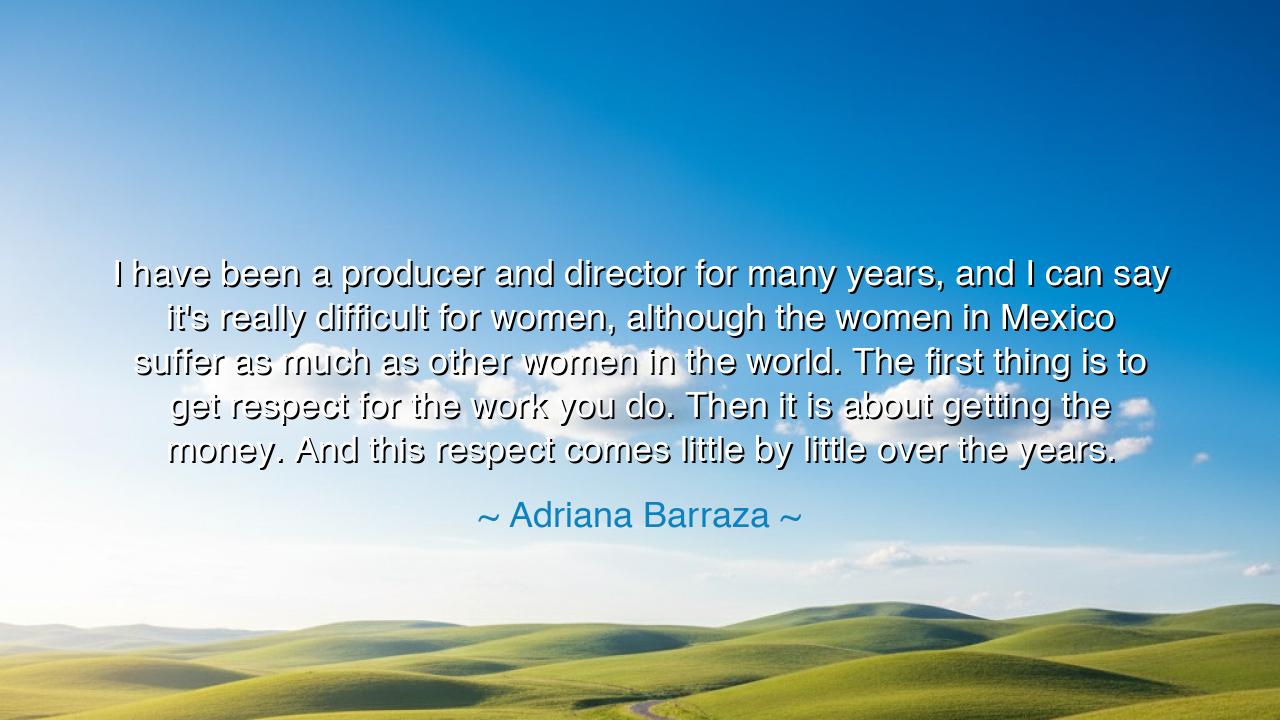
I have been a producer and director for many years, and I can say
I have been a producer and director for many years, and I can say it's really difficult for women, although the women in Mexico suffer as much as other women in the world. The first thing is to get respect for the work you do. Then it is about getting the money. And this respect comes little by little over the years.






The words of Adriana Barraza—“I have been a producer and director for many years, and I can say it's really difficult for women, although the women in Mexico suffer as much as other women in the world. The first thing is to get respect for the work you do. Then it is about getting the money. And this respect comes little by little over the years”—speak with the quiet force of experience, forged in endurance and illuminated by dignity. Her words are not those of complaint but of truth: the truth that in every era, the path of women who create, lead, and command is a long climb toward respect, one earned not by demand, but by perseverance, excellence, and time. Hers is a wisdom both ancient and modern, for the struggle for recognition has existed since civilization first gave voice to ambition.
In the age of the ancients, women too were makers and thinkers—Hypatia of Alexandria, the philosopher and mathematician, stood before men who feared her brilliance, teaching geometry and astronomy in a world that doubted her right to speak. Like Barraza, she understood that respect is not granted—it is built, stone by stone, with every act of courage, every hour of craft, every word spoken despite the silence around it. Hypatia’s life ended in violence, yet her ideas endured; this, too, is a form of triumph. It shows that the work of a woman, once born, cannot be erased by those who refuse to honor it.
Adriana Barraza’s own story is one of this same steadfastness. Born in Mexico, she rose not through privilege but through devotion to her craft—acting, teaching, directing, and producing in an industry where women were often treated as ornaments rather than architects. When she says “respect comes little by little,” she speaks for every woman who has had to prove her worth twice: once through talent, and again through endurance. She reminds us that time is both the enemy and the ally of the oppressed—it tests the spirit, but it also reveals those who cannot be defeated.
Her words also touch a deeper truth about value—that respect must precede reward. “The first thing is to get respect for the work you do. Then it is about getting the money.” In the old kingdoms, the artisans who chased gold before mastery were forgotten, but those who worked for honor became legends. Barraza’s philosophy echoes this timeless law: that money without respect is hollow, but respect earned through discipline leads to both prosperity and peace. She speaks not only to women in film, but to all who struggle in the shadows, unseen and undervalued, yet faithful to their purpose.
Consider the story of Frida Kahlo, another daughter of Mexico, whose art was first dismissed as strange, even grotesque. Yet she painted through pain and through silence, and only decades later did the world finally recognize her genius. Respect, for her as for Barraza, came “little by little”—but when it came, it was unshakable. This is the ancient rhythm of recognition: slow, sometimes cruelly delayed, but inevitable for those who persist. In this rhythm, patience becomes a form of power, and work becomes a form of prayer.
There is also humility in Barraza’s truth. She does not speak of conquest or revenge, but of the slow, sacred art of earning. “It is really difficult for women,” she admits—not as defeat, but as acknowledgment of a shared burden across borders and generations. In this, she becomes a voice for all women—Mexican, American, Indian, African—each one fighting to be seen for her labor, her mind, her art. It is a global sisterhood of struggle, one that transcends culture, and her words honor that bond.
The lesson she leaves is one of endurance and quiet strength: seek not immediate validation, but enduring respect. Let your work speak louder than the world’s indifference. Build your craft with love, even when no one watches. Respect cannot be demanded from others until it is cultivated within oneself. And when you have earned it—through honesty, excellence, and perseverance—then, and only then, will reward follow. For the universe, like time itself, bends toward those who endure.
So, my child, when the world doubts your worth, do not despair. Keep building, keep creating, keep standing in your truth. As Adriana Barraza teaches, the respect that comes slowly is the respect that lasts forever. It may come “little by little,” but when it does, it will shine like the morning sun—undeniable, unwavering, and eternal.






AAdministratorAdministrator
Welcome, honored guests. Please leave a comment, we will respond soon